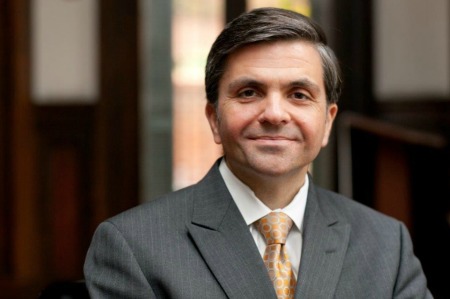Jerry Falwell Jr, Shane Claiborne and the Politics of Jesus

Is it possible to talk about Jesus too much in politics? Is "What Would Jesus Do" politically relevant? Frequent rhetoric from Religious Right and Religious Left beg the question.
Liberty University President Jerry Falwell Jr., a prominent Evangelical supporter of President Trump and son of one of the Religious Right's founders, provoked controversy with this recent tweet:
Jesus said love our neighbors as ourselves but never told Caesar how to run Rome-he never said Roman soldiers should turn the other cheek in battle or that Caesar should allow all the barbarians to be Roman citizens or that Caesar should tax the rich to help poor. That's our job.
Falwell then added:
All the clowns commenting on my tweet below with their bowels in an uproar can relax b/c the other side of the coin is Jesus never told Caesar he shouldn't tax the rich to help the poor either. You can be a good Christian whether you vote conservative or liberal!
Evangelical Left activist Shane Claiborne, who's been trolling Falwell many months with his challenge to debate whether Jesus would support Trump, tweeted responsively:
Honestly, this is some of the worst theology I've ever heard. And this heresy is from the president of the largest Christian university in the world.
And then:
Not only is this "bad" theology... it is also deadly theology. Similar ideology was used to justify apartheid and to excuse Hitler... this notion that sin is personal but rulers are immune to it.
Plus:
The idea that Caesar or a Roman soldier... or anyone... is exempt from God's command to love our enemy, care for the poor, or welcome the stranger is heresy. Jesus said we will ALL be asked how we cared for "the least of these." (Mt.25)
Evangelical Left author and pastor Brian Zahnd tweeted supportively with Claiborne:
It's truly amazing. And there's a part of me that feels sorry for @JerryFalwellJr and those who share his views. I'm convinced they believe what they say, but it only serves to show how far from Jesus people baptized in religious nationalism can be. We need to send missionaries.
And Claiborne is apparently mulling a Religious Left protest in Falwell's Lynchburg:
If we were to organize a #LynchburgRevival where there was preaching, worship and prophetic action... that challenged the toxic evangelicalism of @JerryFalwellJr... would you come?
In 2008 Claiborne wrote a book Jesus for President, which I reviewed here, which was a neo-Anabaptist polemic likening America to Ancient Rome, Babylon and the Third Reich. Ostensibly faithful followers of Jesus abjure "empire" and its violence while also demanding the empire universally feed, cloth, medicate, and award automatic citizenship. This perspective is largely based on the teachings of the late modernist Mennonite theologian John Howard Yoder, who reinterpreted the Cross primarily to signify rejection of all violence and power instead of atonement from sin.
Claiborne and other Christian activists of the Left like accusingly to ask "Whom would Jesus bomb?" "Whom would Jesus deport?" "Whom would Jesus execute?" "Would Jesus open carry?" "Would Jesus support Trump?"
The answer to these questions is nobody and no, but not for the reasons Claiborne et al offer. Jesus during His earthly walk of several years was a prophet, preacher, healer, and above all Savior of humanity. He didn't marry, have children, own property (apparently), work for wages (at least presumably not after leaving his earthly father's carpentry shop), or do a lot of what ordinary people are called to do. He had a special calling, the most unique ever in history, which He fulfilled wondrously, and which He still fulfills.
Jesus during His relatively brief ministry didn't make political statements, about which Falwell was correct, nor would He have taken up arms, about which Claiborne is correct, because these exercises of earthly power, while not wrong of themselves in the right circumstances, weren't His calling.
But Falwell perhaps is similar to Claiborne, at least in these tweets, in projecting too much onto the earthly ministry of Jesus. The Christian faith has many principles, based on the Scriptures that include but are not confined to the Gospels, along with two millennia of church tradition, that should guide our understanding of politics, without typically offering dogmatic specific policy instruction in contemporary times. Claiborne should agree with Falwell that Christians can sincerely operate within different political perspectives. It also should be pondered that Christian faith by itself doesn't necessarily guarantee compelling political insight. Wonderful saints can be politically clueless.
Claiborne as a lay political activist believes he serves Jesus by organizing demonstrations and sometimes getting arrested in acts of civil disobedience on behalf of causes of the Left. Falwell, as a layman and college president, believes he does so with his pro-Republican pronouncements. Maybe each, with different understandings of Jesus, has very different callings that serve wider providential purposes.
It's important to remember that Christians understand Jesus not just as the earthly prophet, healer and preacher Who was crucified but also as the Risen Savior and Second Person of the Trinity, present before the foundation of the universe, Who rules and will rule forever. This understanding precludes pigeonholing Him into our earthly political categories of the moment. Instead of emphatically claiming Him for our causes, and confidently asking "What Would Jesus Do," we can bow before Him reverently and struggle modestly to understand His will on earth, asking what He might have us do.
Originally posted at Juicy Ecumenism.





















